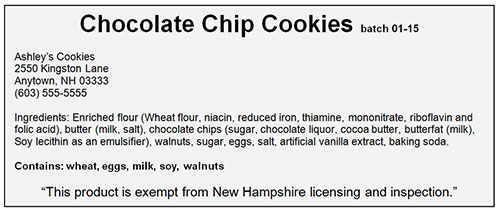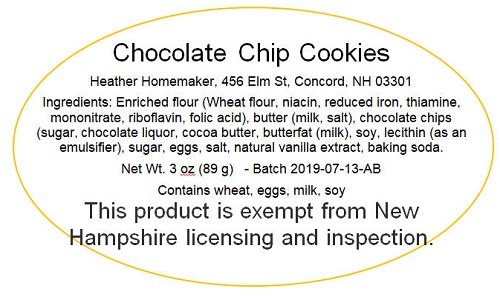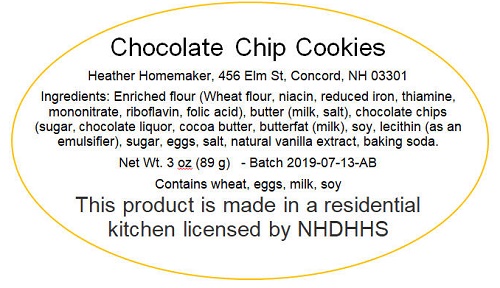
Looking for New Hampshire Cottage Food Laws and Regulations: How to sell your homemade foods in New Hampshire in 2024? Scroll down this page and follow the links. And if you bring home some fruit or vegetables and want to can, freeze, make jam, salsa or pickles, see this page for simple, reliable, illustrated canning, freezing or preserving directions. There are plenty of other related resources, click on the resources dropdown above. If you are having a hard time finding canning lids, I've used these, and they're a great price & ship in 2 days.
If you have questions or feedback, please let me know! There are affiliate links on this page. Read our disclosure policy to learn more.
New Hampshire Cottage Food Laws and Regulations: How to sell your homemade foods in New Hampshire
New Hampshire Cottage Food Laws, Regulations and Facts
Date of the enactment of the cottage food law: 2011. Cottage foods are called Homestead Foods.
There are two types of Home Food Operations in New Hampshire: exempt from licensing and those that require a license.
Exempt:
A Homestead Food License is not required if:
- You only sell your non-potentially hazardous food from your own residence, from your own farm stand or at a farmer’s market and
- You do not exceed a maximum gross sales of $35,000. It used to be $20,000 but they recently raised the limit.
Non-Exempt:
A Homestead Food License is required if:
- Your income from your homestead food products exceeds $35,000 or
- You wish to sell your non-potentially hazardous products to restaurants, other retail food establishments, over the Internet, by mail order or to wholesalers, brokers or other food distributors.
See frequently asked questions for NH Homestead Foods here. Here is a summary fact sheet from the NH government you can download and print
out.
Which foods are subject to the New Hampshire Cottage Food law?
Allowed foods: Non-Temperature Control for Safety (TCS) foods.
A homestead food processor is allowed to make and sell "non-potentially hazardous foods" that do not require time and/or temperature control for safety and can be can be safely kept at room temperature and do not require refrigeration).
Examples are:
- breads, cookies,
- fruit pies (that do not require refrigeration),
- jams, jellies, preserves (Note: if you are non-exempt; you must use recipes approved by the National Center for Home Food Preservation (NCHFP) or else you must to submit a process review, which is conducted by a food processing authority on each product prior to its being produced by the license holder. If the food processing authority declares in writing that there are no biological concerns with the food after evaluating the process review and does not identify the product as an acidified food, then the food is allowable to be produced. ) Note: that except where stated otherwise, all Pickyourown.org canning recipes closely follow the NCHFP process)
- apple butter or other fruit butters - However, a process review is required for apple butter or other fruit butters to determine the safety of the finished product.
- honey, sorghum,
- cracked nuts,
- packaged spices and spice mixes,
- Hard candies, lollipops and peppermint candies
- dry cookie, cake, and soup mixes;
- Dry bread mixes
- roasted whole bean coffee or ground coffee
- sweet breads, muffins or other baked goods made with fresh fruits and vegetables like zucchini, pumpkin, and strawberries - , as long as the fruits or vegetables are incorporated into the batter and properly baked, labeled and packaged.
Prohibited foods
“TCS foods” means a food requires temperature control for safety because they are capable of supporting the rapid growth of pathogenic or toxigenic microorganisms, and the growth of toxin production of Clostridium botulinum. Potentially hazardous foods also include process acidified and low acid canned foods such as pickles and relish.
TCS foods also include processed acidified and low
acid canned foods such as pickles, salsa and relish.
Examples of
prohibited foods:
- Meat (beef, pork, lamb)
- Poultry (chicken, turkey, duck)
- Fish
- Shellfish and crustaceans
- dried meats, jerky etc.
- dehydrated fruits or vegetables
- Eggs
- Milk and dairy products
- Cooked, plant-based foods (fresh or canned), such as cooked rice, beans, vegetables, salsas, tomato sauces, spaghetti sauces, or foccacia bread with roasted vegetables
- Cheesecakes, pumpkin pies, custards, pies that conmtain dairy or require refrigeration,
- Soups, sandwiches
- Acidified or low acid foods such as pickles and relish.
- Baked potatoes
- Mushrooms
- Raw sprouts
- Tofu and soy-protein foods
- Untreated garlic and oil mixtures
- Pickles
- Salsa
- Relish
- Cooked vegetable products
- Pumpkin butter - it is considered to be a low-acid food that cannot safely be made in a residential kitchen.
- Apple cider
- Honey and maple syrup - they are regulated by the NH Department of Agriculture. Please contact 603-271-3551 for more information on honey and maple syrup production. If they use honey or maple to make a product, like maple candy, they would need to be licensed.
- Moist quick breads like zucchini bread, pumpkin bread and banana bread
- Uncooked frozen bread dough or pizza dough (it requires refrigeration - and anything that must be refrigerated or frozen is prohibited)
If your food product does not meet the definition of an allowed Cottage Food:
Don't give up. You may still be able to make and sell it commercially, through a startup approach.
First, you may be able to rent space in a local licensed commercial kitchen.
Second, if that doesn't work, you may be able to get a co-packer to make the food for you.
Definitions:
- "Homestead Food License"
Labels
Licensing
Exempt:
A Homestead Food License is not required if:
- You only sell your non-potentially hazardous food from your own residence, from your own farm stand or at a farmer’s market and
- You do not exceed a maximum gross sales of $35,000
Non-Exempt:
A Homestead Food License is required if:
- Your income from your homestead food products exceeds $35,000 or
- You wish to sell your non-potentially hazardous products to
- restaurants,
- other food establishments not including retail food stores,
- over the Internet,
- by mail order or to

- wholesalers, brokers or other food distributors.
License Application
The following information must be submitted with the license
application:
Homestead License Application Form ![]()
- You must meet the licensing requirements for a Class H Homestead license, which has a fee of $150.
- Written results of laboratory analysis of water for bacteria, nitrates and nitrites. (n/a if Town Water)
- A complete list of the product(s) you are manufacturing.
- For other processed, "jarred" foods, such as, but not limited to: BBQ and hot sauces, mustards, pepper jellies, etc., include a copy of the process review.
- Copy of a sample of finished product labels. See labeling below.
- Forming your business - links to each state's Secretary of State's Office website
- New Hampshire state and local health department contact information.
- Also, there are 15 self-inspecting cities and towns. If you desire to
sell your product in any of these self-inspecting communities, you must check with them to see if a license is needed.
It is unlawful for any person, unless exempted under RSA 143-A:5, to operate a food service establishment or retail food establishment within the state without having obtained a food service license. If the DPHS Food Protection Section is satisfied that the information regarding the applicant, the applicant's operation and facilities are in compliance with He-P 2300, the NH Rules for the Sanitary Production and Distribution of Food, a license shall be issued.
 Labeling requirements
Labeling requirements
Cottage Food Production Operations must label all of their food products properly, which includes specified information on the label of each unit of food product offered or distributed for sale.
All processed packaged foods bear a label stating the
- name and address of the manufacturer/packer/distributor/processor preparing the food,
- common name of the food,
- name of all the ingredients in the food in descending order of predominance by weight.
- the net weight of the food in English or metric units.
- A product code which includes date of manufacture, container size, and product lot or batch number to aid in a recall of product in case of a public health hazard. Note:this number can be your "baked on" date.
- List of major allergens.
- For exempt Homestead Food Products, the label must also state in at least 10pt font: "This product is exempt from New Hampshire licensing and inspection."
- For non-exempt (licensed) Homestead Food
Products, the label must also state in at least 10pt font: "This
product is made in a
 residential kitchen licensed by NH DHHS."
residential kitchen licensed by NH DHHS." - For wedding cakes, birthday cakes and other specialty cakes that are not easily packaged, you must include all labeling requirements on the invoice and deliver the invoice with the cake. Smaller cakes must be boxed and the label must be included on the box
It is recommended that honey manufacturers/processors include this additional statement to their product label: "Honey is not recommended for infants less than twelve (12) months of age".
Exempt: Here is a free Microsoft Word label template which you can download and edit.
Licensed: Here is a free Microsoft Word label template which you can download and edit..
These labels are already formatted to fit on Avery Template 22820 Print-to-the-Edge Oval, Labels 2" x 3-1/3", 8 per Sheet, Glossy White. You can get the label stock online (see at right).
Depending on the size of your business, your label must comply with Federal label regulations and with the new nutritional labeling law. You can download a copy of the FDA Food Labeling Guide here it s an illustrated booklet that should answer all your questions. You may see that the sample label does not include a "nutritional panel" (calories, fat, protein, vitamins, etc.) . This is because if you sell (in the U.S. only) fewer than 10,000 units and hire fewer than 10 full-time employees yearly; you do not have to have a nutrition panel on your label, nor file a small business nutritional labeling exemption notice with the FDA.
Where may Cottage Food Production Operations sell the food products?
Cottage Food Products may not be sold across state lines. In other words, only be sold within the state.
Exempt operations may sell products from
- your own residence,
- from your own farmstand,
- at a farmer's market or
- retail food store
Licensed Homestead food operations (but not exempt operations) may sell to
- restaurants,
- other food establishments excluding retail food stores,
- over the Internet,
- by mail order or
- to wholesalers, brokers or other food distributors.
Other requirements
- Individuals can only sell their products directly to consumers, (that allows sales from home and at events)
- Cottage food operations can sell up to $20,000 of products per year.
- You must meet local zoning or other laws - contact your
local unit of government to determine if there are local
regulations that will affect their business. Also note there are
15 self-inspecting cities and towns
that regulate food in their communities, contact the local authority regarding licensing. See http://www.dhhs.nh.gov/dphs/fp/documents/selfinspect.pdf - You may not use commercial type equipment such as large rotary mixers
- Home equipment, stove and/or refrigerators do not need to be NSF approved
- Farmers markets and other direct marketing venues may still require vendors to have a food establishment license or to meet other requirements, even if you are exempt. It is their right and perogative to set their own standards.
- You cannot make products in a rented kitchen and sell them under the Homestead License. The Homestead food license applies only to non-potentially hazardous foods made in the kitchen of your residence
- Homestead food products may not be made in an outbuilding on your property, like a shed or a barn
- Also see
Self-inspecting Cities and Towns List

Recommendations:
Get the Servsafe and CPFM Study Guide for Food Manager Certification in Paperback
And get the ServSafe Food Handler Guide
Beyond the requirements, common sense, good practices and reducing liability suggests you should do the following.
Training
Testing of pH
It's best to use a pH meter, properly calibrated on the day
used. I use this one, which is reliable and inexpensive.
And this pH meter is really good, but isn't always available.
Short-range paper
pH test strips, commonly known as litmus paper, may be used
instead, if the product normally has a pH of 4.0 or lower and the
paper's range includes a pH of 4.6.
Record-keeping is suggested
Keep a written record of every batch of product made for sale, including:
- Recipe, including procedures and ingredients
- Amount canned and sold
- Canning date
- Sale dates and locations
- Gross sales receipts
- Results of any pH test
Sanitation
Although inspections are not required, you should consider doing the following:
- Use clean equipment that has been effectively sanitized prior to use
- Clean work surfaces and then sanitize with bleach water before and after use
- Keep ingredients separate from other unprocessed foods
- Keep household pets out of the work area
- Keep walls and floors clean
- Have adequate lighting
- Keep window and door screens in good repair to keep insects out
- Wash hands frequently while working
- Consider annual testing of water if using a private well
Best Practices
- Allergens: Most state home baking
acts require an "ingredient statement" and/or an "allergen
listing" on the label of the bakery item for sale; but if your
state does not, you should anyway. The eight major food
allergens are
- milk,
- eggs,
- fish,
- crustacean shellfish,
- tree nuts,
- peanuts,
- wheat and
- soybean.
- Cross-allergenicity: There are also ingredients available, even flours, that can cause a cross-allergenicity. The American Academy of Allergy Asthma & Immunology explains cross-allergenicity as an allergic reaction when proteins in one substance are similar to the proteins found in another substance. For example, consumption of lupine flour may trigger an allergic reaction to peanuts, and cricket flour may trigger an allergic reaction to shellfish. Again, providing such information might be a beneficial marketing tool and help keep potential consumers safe.
- The 2 Hour/4 Hour Rule - Anyone
wishing to make and sell refrigerated bakery items should
remember to follow the "2 Hour/4 Hour Rule." This is a system
that can be implemented when potentially hazardous foods are out
of temperature control (temperatures greater than 45 degrees
Fahrenheit) during preparation, serving or display for sale. The
rule guidelines are as follows:
- If a potentially hazardous food has been out of temperature control for 2 hours or less, then it may continue to be used or be placed back in the refrigerator.
- If a potentially hazardous food has been out of temperature control for more than 2 hours but less than 4 hours, it needs to be used quickly or discarded.
- If a potentially hazardous food has been out of temperature control for more than 4 hours, it must be discarded.
More resources:
- New Hampshire state Homestead Food guidance
- FDA Food labeling information.
- Good to know (not a requirement): Guidelines for Determining Metric Equivalents of Household Measures (October 1, 1993)
- Massachusetts has a Food Processors Resource Manual
that is a practical guide for specialty food and start-up food
processors published by the Massachusetts Department of
Agricultural Resources. The marketing and practical tips can be
very useful to a cottage food kitchen in any state.
The chapters are available online and as a downloadable document
pdf format
Introduction
Starting Out
Production
Residential Kitchens: Questions and Answers
Developing a Business Plan
Label and Product Regulations
Label Design
Promotion
Distribution and Sales
Trade Shows
Using the Internet for Marketing
Questions? Contact Information:
If you need information to determine if you need to be licensed or if your product is considered to be potentially hazardous, the state of NH would be happy to consult with you.
Please contact: (603) 271-4589 or
Email: DHHS.FoodProtection@dhhs.nh.gov.
Looking for canning equipment and supplies?
Water bath canner with a jar rack
Pressure canners for gas, electric and induction stoves: Presto 23Qt or T-fal 22Qt
Canning scoop (this one is PERFECT)
Ball Blue book (most recent version)
Jars: 8oz canning jars for jams
Find Other types of farms:
Farm markets and roadside stands
Road trips and camping resources
Local Honey, apiaries, beekeepers
Consumer fraud and scams information
Home canning supplies at the best prices on the internet!
Maple Syrup Farms, sugarworks, maple syrup festivals
Environmental information and resources
Farms For Your Event for birthday parties, weddings, receptions, business meetings, retreats, etc.
Festivals - local fruit and vegetable festivals
Get the
most recent version of
the Ball Blue Book
With this Presto 23 quart pressure canner and pressure cooker, you can "can" everything, fruits, vegetables, jams, jellies, salsa, applesauce, pickles, even meats, soups, stews. Model 01781

You can make jams, jellies, can fruit, applesauce, salsa and pickles with water bath canners, like this Granite Ware 12-Piece Canner Kit, Jar Rack, Blancher, Colander and 5 piece Canning Tool Set

